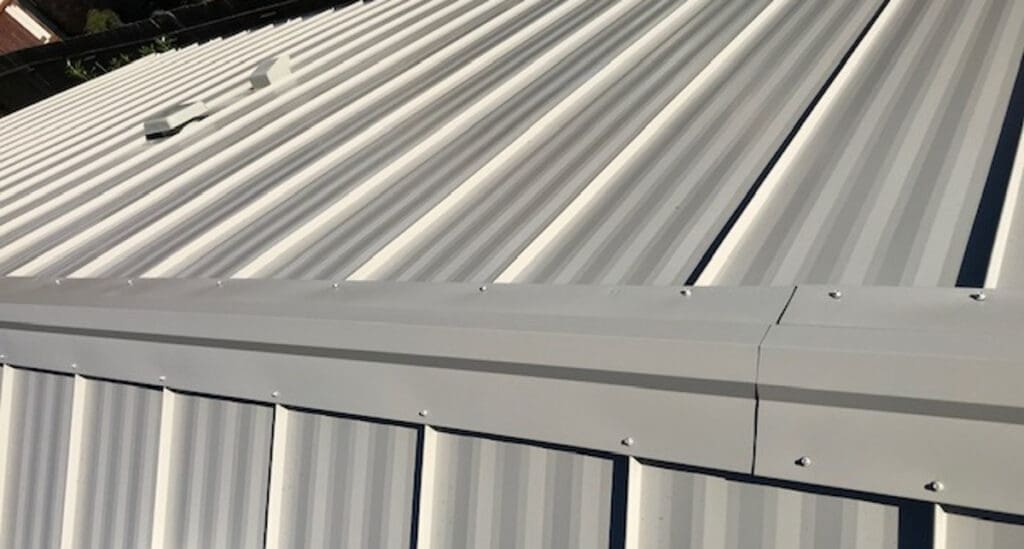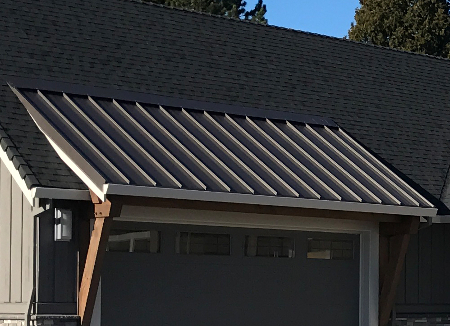
Published on March 1, 2024
Exploring the Beauty and Benefits of Residential Metal Roofing
When it comes to roofing options for your home, metal roofing is gaining popularity for its durability, energy efficiency, and aesthetic appeal throughout the United States. However, many homeowners may still be unfamiliar with the different types of residential metal roofing available and the numerous benefits they offer.
In this comprehensive guide, we’ll dive into the world of residential metal roofing materials, exploring its various types, durability, cost, and advantages, to help you make an informed decision for your home. No matter what type of home you have–farmhouse to Victorian to mid-century modern–there’s a type of metal roofing for you.
What are the Different Types of Home Metal Roofing?
With a variety of styles and colors, there are metal roof types for every taste. Mix and match to create different points of interest or stay consistent throughout. Either way, you’ll have great-looking–and long-lasting–protection from the elements.
Standing Seam Panel Metal Roofing
Featuring vertical seams that interlock to create a sleek, modern appearance, standing seam metal roofing is a popular choice for residential applications. Its raised seams provide excellent water resistance and a clean, contemporary aesthetic.
Metal Shingles
Mimicking the appearance of traditional roofing materials such as wood, slate, or asphalt shingle roofs, metal shingles combine the durability of metal with the timeless look of classic roofing styles. They come in a variety of shapes and colors to suit any architectural style, including cedar shake and slate profiles.
Copper Roofing
Known for its striking beauty and longevity, copper roofing develops a natural patina over time, adding character and charm to any home. While initially expensive, copper roofing is a great option for durability and unique aesthetic appeal.
Corrugated Metal Roofing
Recognizable for its distinctive wavy pattern, corrugated metal roofing offers a rustic charm and excellent durability. It’s often used in agricultural and industrial settings but can also be an attractive accent option for some residential properties.
 How Durable is Metal Roofing?
How Durable is Metal Roofing?
Residential metal roofing is renowned for its exceptional durability and longevity. Unlike traditional roofing materials such as asphalt shingles, which may require replacement every 20-30 years, metal roofing can last 50 years or more with proper maintenance. Its resistance to extreme weather conditions, including high winds, hail, and heavy snow, makes it an ideal choice for homeowners seeking long-term protection and peace of mind.
Does Metal Roofing Rust?
One common concern about metal roofing is the possibility of rust. However, modern metal materials are typically coated with a protective layer of zinc, roofing is highly resistant to corrosion and rust formation. With proper installation and maintenance, rust is not a significant issue for residential metal roofing systems.
Is Metal Roofing Expensive?
While the initial cost of metal roofing may be higher than traditional roofing materials such as asphalt shingles, its long-term cost-effectiveness and durability make it a wise investment for homeowners. Metal roofing’s extended lifespan, energy efficiency, and minimal maintenance requirements can result in significant savings over time, outweighing its initial price point.
What are the Many Benefits of Metal Roofing?
Energy Efficiency: Metal roofing reflects solar radiation, reducing heat absorption and lowering cooling costs in warmer climates. Additionally, some metal roofing systems can be installed with insulation to further enhance energy efficiency and indoor comfort.
Durability: With superior resistance to fire, wind resistance, and ability to withstand hail and other impact damage, metal roofing provides lasting protection for your home, minimizing the need for frequent repairs or replacements.
Environmental Sustainability: Metal roofing is recyclable at the end of its lifespan, making it an environmentally friendly choice for homeowners seeking sustainable building materials.
Longevity: With proper installation and maintenance, metal roofing can last 50 years or more, providing enduring value and peace of mind for homeowners.
Weight: Although you probably don’t think about the weight of your roof very often, roofs are only designed to handle so much weight. Metal roofing is the lightest roof material on the market per square foot, much less than asphalt shingle, clay tile, and slate roofing. This means you won’t have to worry about added support during installation.
FAQs about Metal Roofing
1. Will a metal roof be noisy during rainstorms?
Contrary to popular belief, properly installed metal roofing is no noisier than other roofing materials during rainstorms. With proper insulation and underlayment, any sound from rain or hail is typically minimal and not disruptive.
2. Can I walk on a metal roof?
Yes, metal roofing is designed to withstand foot traffic, but caution should be exercised to avoid damaging the roof surface. If you need to walk on metal roofs, use proper footwear and take care to distribute weight evenly, stepping where the roof is fastened to the trusses.
3. Is metal roofing suitable for all climates?
Metal roofing is suitable for a wide range of climates, including areas prone to high winds, heavy snow, and extreme temperatures. Its durability, resistance to weathering, and ability to shed snow make it an excellent choice for homes in diverse geographical regions. In sunnier environments, metal roofing reflects warming UV rays to help keep the house cooler. In colder regions, metal roofing offers great insulation, helping to keep the home warm.
4. Will a metal roof attract lightning?
Metal roofing does not attract lightning strikes any more than other roofing materials. In fact, metal roofing’s noncombustible nature makes it a safer option in the event of a lightning strike, as it disperses energy rather than igniting.
5. Can I install solar panels on a metal roof?
Metal roofing provides an excellent surface for solar panel installation, offering a durable and stable platform for mounting the panels. Many metal roofing manufacturers offer systems designed to seamlessly integrate with metal roofing panels. If you are considering solar panels, make sure to use an experienced, qualified installer so they don’t damage the metal roofing.
Residential metal roofing offers a compelling combination of durability, energy efficiency, and aesthetic versatility, making it an attractive option for homeowners seeking long-term value and performance. By understanding the different types of metal roofing available and the numerous benefits they offer, homeowners can make an informed decision.
Have more questions about types of metal roofing for residential homes? Reach out to Warner Roofing and Construction for a free estimate on metal roofing installation, what style works best for your home, and even available colors to match the rest of your home! This is an investment in your home that will last as long as you own your home–and beyond!